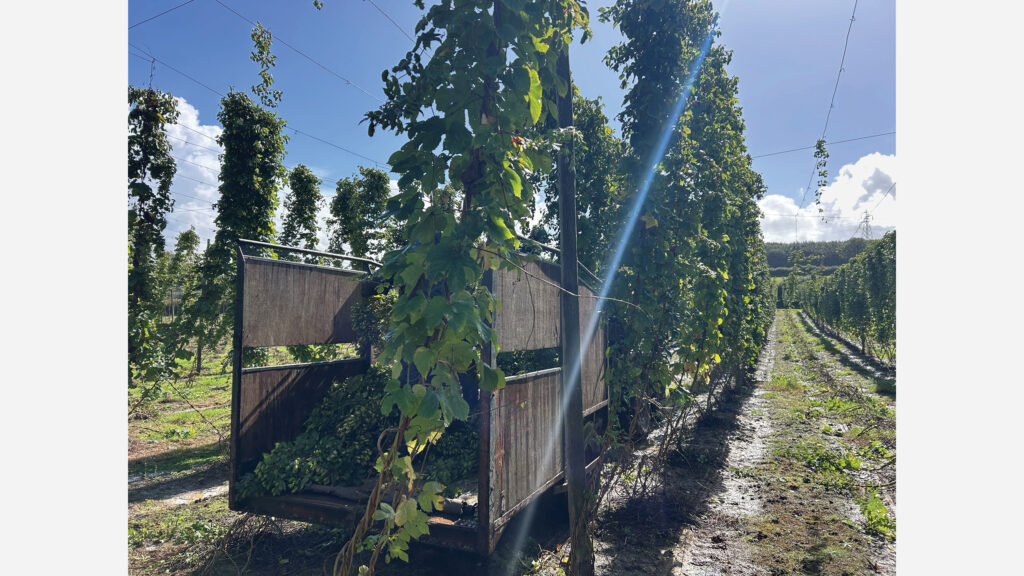East Sussex farm preserves Britain’s hop-growing heritage
 Hop growing at Tibbs Farm © MAG/Lois King
Hop growing at Tibbs Farm © MAG/Lois King Hops have been grown on Tibbs Farm by LE Wheeler & Sons since 1956, but the farm’s heritage in crop growing stretches back to 1690.
Today, brothers Phil and Simon Wheeler run the family farm in Rye, East Sussex, and remain one of just 44 hop growers left in the UK.
Covering just over 16ha of hops, Tibbs Farm uses a mix of older methods and more modern agricultural techniques.
See also: 7 organically approved soil amendments to boost cropping systems
The Wheelers also run 8ha of pick-your-own fruit, a handful of pumpkins and Christmas trees, a café with a farm shop, and a thriving sheep enterprise.
Hop farming

Hops harvesting at Tibbs Farm © MAG/Lois King
Hops are a perennial crop and arguably one of the most labour-intensive in the world. “We need 12 people for three to four weeks during harvest,” explains Phil.
Despite technological changes over the decades, the farm still uses a 1960s Bruff hop-picking machine.
The process is thorough: two people hang the hops upside down, allowing the pickers to strip the hop bines.
Lateral pickers then remove the hops, which are cleaned via sieves and a series of angled conveyors.
A “waterfall” system using four more conveyors ensures even more debris is removed.
The clean hops are then passed on a conveyor belt into the mill, where they are dried using two kilns which extract moisture from about 70-80% until they reach a level of 8-9%.
“Anything over 12% and the hops risk going bad,” Simon says.
Once dried, the hops are left to condition for 12–24 hours, before finally being baled into 50kg packs.
“In a good market, we can get 500 bales off 16ha, but different varieties vary in terms of yield,” he says.
Varieties
Tibbs Farm grows several hop varieties including Fuggle, Target, Goldings and a small area of Admiral. Fuggle is an old English variety dating back to 1875.
Though lower yielding, it’s in high demand as it is a traditional variety that brewers like. However, it can be a challenging crop to grow because of soil diseases.
In contrast, Admiral is high yielding but has little market demand, hence the lower area grown.
“Everything we grow is under contract – without one, you’d basically be giving them away,” says Simon.
The hops are sold through the EML Co-operative, with Harvey’s Brewery in East Sussex being known as one of the end users.
Since Covid, the UK hop market has halved, with hops now dominantly imported from Germany and the US, where yields are higher than those in the UK.
With prices paid per kg, it is important to monitor moisture, yield and quality to ensure optimum results.
Agronomy is vital
Critical to the crops’ success is agronomy. Hops are walked weekly in April, with moulds and pests such as mildew and red spider mite a constant threat.
“If you miss a spray round, it can be fairly bad,” says Phil.
Like most crops with the dry weather, yields are usually lower than average, but disease pressure is improved.
“We don’t plough or cultivate. We’ve got lots of worms and just use the sheep,” says Simon.
Over winter, sheep graze the crop after picking – preserving soil health. In spring, the sheep are removed to ensure all nutrients support the hops.
Looking ahead, the Wheelers are investing in diversifications to help support the challenges they are facing with the hop industry.
Plans include Friday night food events in their café and a hop festival, which will help grow the “farm experience”, rather than just the commercial side.
In a country where hop acreage has plummeted from 31,160ha in the 1800s to just 2,000ha today, Tibbs Farm continues to represent an example of resilience, tradition and thoughtful innovation.
